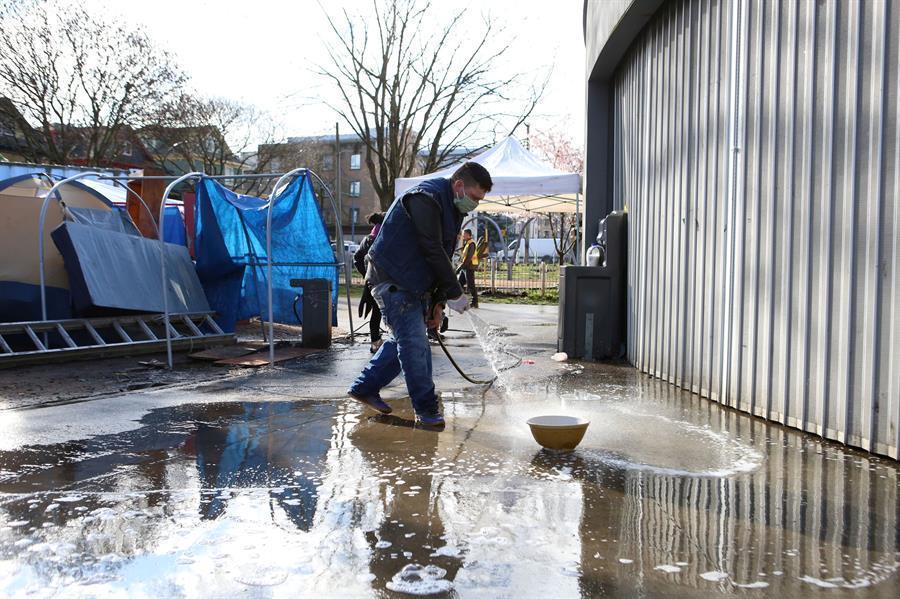
A resident of the Oppenheimer Park homeless encampment wears a protective face mask at a communal washing area, as the number of coronavirus disease cases continues to grow in Vancouver, British Columbia, Canada, on March 25, 2020. (REUTERS File Photo)
As many as 100,000 Canadians could die unless strong controls are practiced to slow the spread of COVID-19, Canadian health authorities predicted on April 9.
For the first time, officials presented national figures of infection and deaths under three models; strong control measures like social distancing and weaker ones and no controls at all.
Officials stressed the figures, based on available data, could change since the situation is fluid and statistics shift.
“Data and models can help Canadians see how our collective efforts … can determine the trajectory of Canada's COVID-19 pandemic,” chief public health officer Dr. Theresa Tam said at a news conference on April 9.
With strong measures, the estimated number of victims will be between 11,000 with 2.5 percent of Canadians infected, and 22,000 if the infection rate reaches 5 percent.
Strong measures include frequent hand washing, staying home except for once-a-week trips to buy groceries and getting prescriptions, and when out staying at least six feet (1.5 meters) from others.
“We will have to be disciplined,” Prime Minister Justin Trudeau said at a news conference following the release of the figures. “That is how we will save lives.”
If the measures are not followed, the infection rate could be 25 percent and deaths could reach 100,000. With no control efforts, up to 80 percent of Canadians could be infected with 300,000 deaths.
“These stark numbers tell us we must do everything in our power to stay in the control model,” Tam said.
Dr. Howard Njoo, deputy chief public officer of health, said the first wave of the virus will go on until summer, but there will be months of outbreaks after the virus peaks, meaning strong control measures will need to be continued.
“This will be the new normal,” Trudeau said, “until a vaccine is found.”
Prime Minister Justin Trudeau said the country would not return to normal until a vaccine is developed, which could be as long as 18 months.
Local governments across Canada have ordered non-essential businesses shut to combat the spread, throwing millions out of work.
Canada lost a record-breaking 1 million jobs in March while the unemployment rate soared to 7.8 percent, Statistics Canada said, adding that the figures did not reflect the real toll.
"This was about as bad as it could be," said Derek Holt, vice president of capital markets economics at Scotiabank.
More than 5 million Canadians have applied for all forms of federal emergency unemployment help since March 15, government data showed, suggesting the real jobless rate is closer to 25 percent.
Energy is among the hardest-hit sectors, as the pandemic cuts oil demand. OPEC and allies agreed to cut output by 10 million barrels per day, and Alberta's premier said his province had not been asked to contribute to the curtailments.
Trudeau told reporters the country was "at a fork in the road between the best and the worse possible outcomes," predicting that once the first wave was over, the economy could partially be reopened.
"Normality, as it was before, will not come back full-on until we get a vaccine for this and ... that could be a very long way off."
The Liberal government has announced a range of measures to help businesses totaling around C$110 billion ($78.3 billion) in direct spending, or 5 percent of gross domestic product.
Trudeau's government recalled the House of Commons to meet on April 11 and vote in limited numbers on measures including a wage subsidy worth C$73 billion to soften the economic blow.
Canada's independent parliamentary budget officer predicted the budget deficit would balloon to C$184.2 billion in the 2020-2021 fiscal year from C$27.4 billion in the 2019-2020 fiscal year.